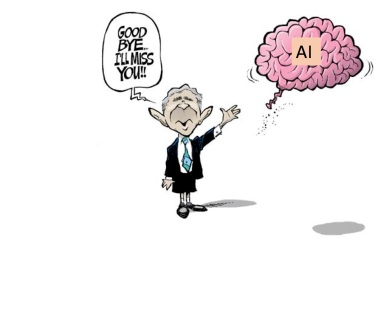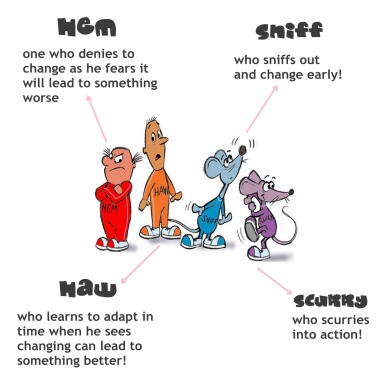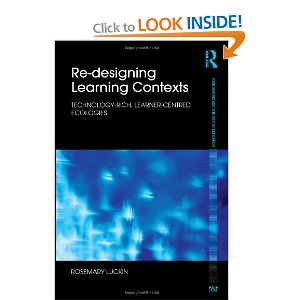I’m pleased to report that my ankle is progressing well and I am now once again able to achieve my ‘misfit‘ challenge of 1000 activity points per day: clearly it is a good job I was only mildly curious. However, I want to be more than mildly curious when it come to my intellect, and I want to do this without injury. I had therefore better take care, both of my own intellect and of the intellect of those I am trying to encourage to be appropriately curious. I therefore return to my thoughts about what a useful self-help book to prepare people for their AI augmented futures, might be like. To this end, I also return to ‘The AI Race‘ and specifically to the man behind the survey that was used to calculate how much of different people’s jobs are likely to be automated.

Andrew Charlton is his name and he is economist and director of AlphaBeta, an economics and strategy consulting firm. He did not beat about the bush! AI will impact on ALL jobs and he encouraged the TV audience to embrace AI. His ‘top tip’ was that we must carefully manage the transition from now to the situation when widespread AI augmentation will be common place.
He was clear that we must take advantage of what AI has to offer by increasing the diversity of our own skills sets. He saw AI as an “Iron Man Suit” for humans. This suit would transform us mere humans into super humans. This is a great analogy, who would not want to be super human? BUT embracing AI augmented working is not as simple as putting on a new outfit – especially an iron outfit. And increasing the diversity of our skill sets requires educators and trainers who are themselves skilled and trained in developing these new diverse skill sets. BUT where are these educators and trainers to be found? Who is helping the educators and trainers to gain the skills and expertise they will need to train their students in?

Andrew has little comfort to offer here. His next comment about education is that 60% of the curriculum that students are studying at school is developing them for jobs that will no longer exist in 30 years-time. We need to re-design the curriculum he advises. So educators need to re-skill themselves as well as their students, and they need to revise the curriculum. Clearly educators will be busy! And clearly there will also be a significant job to be done in (re-)motivating all those students who discover that they have been learning stuff that nobody will want them to know by the time they are looking for a job.
Now we hit the nub of the matter, education and educators must prepare students for the new AI order of things. Educators lives are going to change in significant ways NOT because their roles are likely to be automated away BUT because they will need to teach a different curriculum and probably teach in a different way. To make matters worst: there is no clear consensus from the experts about exactly which jobs educators will need to educate people for. I think educators may be the most in need of a good self-help book to help them cope with the inevitable changes to their lives.

The self-help book I need to write might therefore be the updated version of the motivational best seller Who Moved My Cheese? An Amazing Way to Deal with Change in Your Work and in Your Life. I suggested this might become ‘Who moved my brAIn? An Amazing Way to Deal with ChAnge in Your Work and in Your Life’

The original book called ‘Who Moved My Cheese’ was a story featuring 4 characters: two mice, called “Sniff” and “Scurry,” and two little people, called: “Hem” and “Haw.” These 4 characters all live together in a maze through which they all search for cheese (for cheese think – happiness and success). Their search bears fruit when all of them find cheese in “Cheese Station C.” “Hem” and “Haw” are content with this state of affairs and work out a schedule for how much cheese they can eat each day, they enjoy their cheese and relax.

“Sniff” and Scurry” meanwhile remain vigilant and do not relax, but keep their wits about them. When horror of horrors there is no cheese at Cheese Station C one day, “Sniff” and Scurry” are not surprised: they had seen this coming as the cheese supply had diminished and they had prepared themselves for the inevitable arduous cheese hunt through the maze and they get started with the search together straightaway. In contrast “Hem” and “Haw” are angry and annoyed when they find the cheese gone and “Hem” asks: “Who moved my cheese?” “Hem” and “Haw” get angrier and feel that the situation they find themselves in is unfair. “Hem” is unwilling to search for more cheese and would rather wallow in feeling victimized, “Haw” would be willing to search, but is persuaded not to by “Haw”.

While “Hem” and “Haw” get annoyed, “Sniff” and “Scurry” find a new cheese supply at “Cheese Station N,” and enjoy a good feast. “Hem” and “Haw” start to blame each other for their lack of cheese. Once again “Haw” suggests they go and look for more cheese, but grumpy “Hem” is frightened about the unknown and wants to stick with what he knows, he refuses to search. However, one day “Hem” confronts his fears and decides it is time to move on. Before he leaves “Cheese Station C” he scribbles on the wall: “If You Do Not Change, You Can Become Extinct” and “What Would You Do If You Weren’t Afraid?” He starts his trek and whilst he is still worried, he finds some bits of cheese that that keep him going as he searches. He finds some more empty cheese stations, but also some more crumbs and is able to keep hunting. “Haw” has realized that the cheese did not simply vanish, it was eaten. He is able to move beyond his fears and he feels ok. He decides that he should go back to find “Hem” equipped with the morsels of cheese he has found. Sadly, “Hem” is still grumpy and refuses the cheese morsels. Undeterred, though somewhat disappointed, “Haw” heads back into the maze and a life of cheese hunting. He continues to write messages on the wall as a way of externalizing his thinking and in the hope that “Hem” might one day move on and be guided by these messages. One day “Hem” finds Cheese Station N with all its lovely cheese, he reflects on his experience, but decides not to go back to “Hem”, but rather to let “Hem” find his own way. He uses the largest wall in the maze to write the following (original to the left, my re-interpretation to the right):
| Who move my cheese? | Who moved my brAIn? |
| Change Happens: They Keep Moving The Cheese | Computers keep getting smarter and intelligent tasks are moving from human to machine |
| Anticipate Change: Get Ready For The Cheese To Move | Prepare for some of your intellectual activity to be taken on by AI |
| Monitor Change: Smell The Cheese Often So You Know When It Is Getting Old | Keep checking in on your own intelligence and make sure you are really using it and keeping it fresh |
| Adapt To Change Quickly: The Quicker You Let Go Of Old Cheese, The Sooner You Can Enjoy New Cheese | Adapt to change thoughtfully (quickly is not necessarily right here), make sure you offload intellectual activity carefully so that you maintain your human intellectual integrity |
| Change: Move With The Cheese | Move with the intelligence (both human/natural and machine/artificial) |
| Enjoy Change!: Savor The Adventure And Enjoy The Taste Of New Cheese! | Enjoy intelligence and the experience of your developing greater intelligence – being smart ‘tastes good’! |
| Be Ready To Change Quickly And Enjoy It Again: They Keep Moving The Cheese | Never feel you are intelligent enough and keep striving for intellectual growth |
“Haw” is never complacent and continually monitors his cheese store and searches through the maze and hopes that one day his old friend “Hem” will find his way through and that they will meet again.

Whilst the book “Who moved my cheese” was extremely popular, it was also the subject of considerable criticism. For example, that it was too positive about change, that it was patronizing and compared people inappropriately to ‘rats in a maze’. BUT can I learn anything from this as I try to encourage people to want to understand themselves and their changing intellectual capabilities?
I think there is still value in “Haw’s” writing on the wall and I have tried to clarify this nee value for AI in the right hand column of the table above. I also think perhaps that my original revised title of: “Who moved my brAIn?” is not quite correct. The more important question is “Who moved my intelligence?”.
More to come on this in the next blog post…
 I had a fascinating discussion with Alasdair Blackwell from
I had a fascinating discussion with Alasdair Blackwell from 

